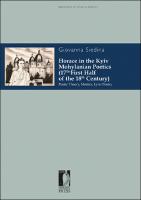Horace in the Kyiv Mohylanian Poetics (17th-First Half of the 18th Century)
Poetic Theory, Metrics, Lyric Poetry
Abstract
This monograph examines, for the first time, the reception of the poetic legacy of the Latin poet Horace (65 B.C.-8 B.C.) in the poetics courses written and taught at the Kyiv Mohyla Academy (17th -first half of the 18th century), in particular in the areas of poetic theory, metrics, lyric poetry. The analysis focuses on three main aspects: theoretical recommendations on the role of the poet and the purpose of poetry, as well as on inventio , dispositio , elocutio , drawn mostly from Ars poetica; the use of Horace’s poetry in the teaching of metrics and the exemplification of metrical schemes (particularly Alcaic and Sapphic stanzas and the dactilic hexameter); the ways in which Horace’s poetry is taken as a model in the composition of poetry, which was a mandatory exercise of the poetics course. The author analyzed the reception of Horace taking into account, on the one hand, the centuries-long Christian reception of the poet, and, on the other, the conception of poetry prevalent at the Mohyla Academy, which saw poetry as an ancillary discipline of moral philosophy, the purpose of which was to contribute to the education of devout Christians and loyal subjects. This approach was in line with the prevalent tendency in European religious schools, whether Protestant, Catholic or Orthodox, especially after the Reformation and the subsequent Counter-Reformation, to see poetry as a rhetorical instrument of Christian morality.


 Download
Download Web Shop
Web Shop